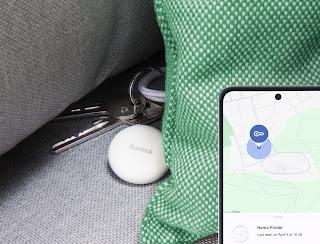We've all been there: frantically patting down pockets, retracing steps, or tearing apart couch cushions in search of lost keys, wallets, or that one elusive bag. Bluetooth trackers like Apple's AirTag have been a game-changer for many, offering peace of mind through precise location tracking. But for Android users, or those simply seeking a more budget-friendly and cross-platform solution, options have felt limited. Enter Hama, a trusted name in accessories, with its compelling answer: the Hama Item Finder.
Hama is positioning the Item Finder squarely as a versatile and affordable alternative to the dominant AirTag. The core promise? Robust item tracking that works seamlessly across both iOS and Android ecosystems. This is a significant departure from the walled-garden approach of some competitors, instantly opening up the market to a much wider audience.
How Does the Hama Item Finder Stack Up?
Based on the details emerging, the Item Finder appears to pack the essential features users expect:
- Precision Finding: Utilizing Ultra-Wideband (UWB) technology (on compatible smartphones), users can get precise, directional guidance to their lost item, seeing distance and direction on their phone screen – a crucial feature when hunting under car seats or behind furniture.
- Crowd Finding Network: Leveraging a vast network of compatible devices (like Apple's Find My network does, but independently), the Item Finder can anonymously ping its location even when far out of Bluetooth range, significantly increasing the chances of recovery.
- Loud Integrated Buzzer: A simple but vital feature – trigger a loud ringtone from the app to locate an item buried in a bag or hidden nearby.
- Compact & Durable Design: Shaped similarly to other disc-style trackers, it's designed to be easily attached to keys, slipped into wallets, or tucked into luggage. Expect water and dust resistance suitable for everyday mishaps.
- User-Replaceable Battery: A practical advantage – the common CR2032 coin cell battery can be easily swapped out when depleted, extending the tracker's lifespan indefinitely without needing a recharge.
The Android Advantage & Competitive Pricing
This is where Hama's pitch becomes particularly potent. Android users finally get a feature-rich tracker with UWB precision finding and access to a large finding network. No longer are they relegated to second-tier options lacking key functionalities.
Furthermore, Hama is hitting the market with an aggressive price point. While official pricing may vary slightly by region, expect the Hama Item Finder to retail significantly lower than an Apple AirTag, likely around the $24.99 / €24.99 mark. For detailed specifications and official announcements, Hama's press release provides the definitive source: Hama Press Release: Item Finder Launch.
Market Impact and Availability
Analysts see Hama's entry as a significant move in the rapidly growing Bluetooth tracker market. As noted in industry commentary from GSMGoTech, this launch represents "Tough Competition for Apple AirTag", highlighting the increasing demand for cross-platform solutions and value-driven options. Hama's established brand presence in consumer electronics across Europe and beyond gives it a strong footing to compete.
The Hama Item Finder is expected to be available imminently through major electronics retailers and online channels. For US customers, Maxgaming lists the product for pre-order/purchase: Hama Item Finder on Maxgaming US. Availability in other regions should follow quickly via Hama's extensive distribution network.
The Bottom Line
The Hama Item Finder arrives as a compelling proposition: affordable, packed with essential features (including UWB precision finding), and crucially, built for everyone – iOS and Android users alike. It directly addresses the key limitations users have faced with platform-exclusive trackers. For consumers seeking a cost-effective, reliable, and universally compatible way to keep tabs on their valuables, Hama might just have delivered the most viable AirTag alternative yet. The era of truly platform-agnostic item tracking seems to be firmly underway.


